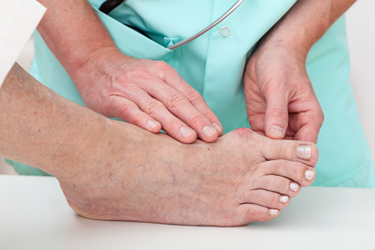North Andover (978) 686-7623
Tewksbury (978) 640-1010
What is a Bunion?
 The medical term for a bunion is referred to as hallux valgus. It appears as a bony protrusion that forms on the side of the big toe and may cause wearing shoes to be uncomfortable. The big toe can become misaligned, and may affect the remaining toes. Some of the symptoms that are associated with this condition can include pain, inflammation, and the toe may appear red. If a bunion is left untreated, arthritis may develop, which can cause deeper joint pain. Genetic factors may play a significant role in developing a bunion, in addition to wearing shoes that do not have ample room for the toes to move freely in. If you notice a bump extending from your toe, it is suggested that you consult with a podiatrist who can properly diagnose and treat bunions.
The medical term for a bunion is referred to as hallux valgus. It appears as a bony protrusion that forms on the side of the big toe and may cause wearing shoes to be uncomfortable. The big toe can become misaligned, and may affect the remaining toes. Some of the symptoms that are associated with this condition can include pain, inflammation, and the toe may appear red. If a bunion is left untreated, arthritis may develop, which can cause deeper joint pain. Genetic factors may play a significant role in developing a bunion, in addition to wearing shoes that do not have ample room for the toes to move freely in. If you notice a bump extending from your toe, it is suggested that you consult with a podiatrist who can properly diagnose and treat bunions.
If you are suffering from bunion pain, contact one of our podiatrists of Foot Health Center of Merrimack Valley. Our doctors can provide the care you need to keep you pain-free and on your feet.
What Is a Bunion?
Bunions are painful bony bumps that usually develop on the inside of the foot at the joint of the big toe. As the deformity increases over time, it may become painful to walk and wear shoes. Women are more likely to exacerbate existing bunions since they often wear tight, narrow shoes that shift their toes together. Bunion pain can be relieved by wearing wider shoes with enough room for the toes.
Causes
- Genetics – some people inherit feet that are more prone to bunion development
- Inflammatory Conditions - rheumatoid arthritis and polio may cause bunion development
Symptoms
- Redness and inflammation
- Pain and tenderness
- Callus or corns on the bump
- Restricted motion in the big toe
In order to diagnose your bunion, your podiatrist may ask about your medical history, symptoms, and general health. Your doctor might also order an x-ray to take a closer look at your feet. Nonsurgical treatment options include orthotics, padding, icing, changes in footwear, and medication. If nonsurgical treatments don’t alleviate your bunion pain, surgery may be necessary.
If you have any questions, please feel free to contact one of our offices located in North Andover, and Tewksbury, MA . We offer the newest diagnostic and treatment technologies for all your foot care needs.






